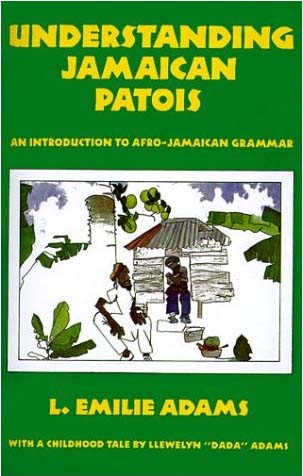
"For me, the most surprising aspect of Jamaican Patois was something I noticed about the accent. While first learning to speak Patois, I found myself occasionally slipping into an Irish accent. It turns out that this wasn’t purely coincidental. Although Jamaica was a British colony, many of the slave owners were Irish. When the African slaves learned English, it was from their Irish slave owners, and remnants of the accent are present to this day. If you don’t believe me, just ask a Jamaican to list the marshmallows in a box of Lucky Charms. Judge for yourself if you can’t hear the hint of an Irish brogue. I promise the experience will at least be entertaining."
Peace Corps Volunter Matt writes: Jamaican Patois
Incoherence
September 26th, 2006
Bamboo Forest
In 1962, Jamaica joined the prestigious club of former British colonies, already membered by such notables as India, Australia, Ghana, and of course the United States. Membership to this club carries only two stipulations: that you adopt English as your national language, and then mangle it until the Queen is spinning in her grave. Each country achieves this to some extent. Australia’s attempts have been more charming than anything. India’s, comically amusing. And let’s not forget our own efforts in the southern States, the Appalachian Mountain range, and a few boroughs of New York. In terms of sheer incoherence, though, Jamaica takes the cake.
I’m sure you’re heard a Jamaican accent before. What you may not realize is that it goes far beyond “Yeah, Mon.” Most Jamaicans, especially in rural areas, speak something called “Patois” (pronounced pat-wah). You may have heard some Patois when listening to Sean Paul, the Jamaican rap star who has become popular in the United States. Patois is essentially slang, evolved to such a degree that it can no longer be classified as a standard language, in this case English. The word Patois is thought to come from the Old French verb patoier, which means, “to handle clumsily.” When you listen to music by Sean Paul, he’s not mumbling; he’s just handling his English clumsily.
A portion of our training was dedicated to learning Patois. A lot of it was a simple change in pronunciation. The word “that” is pronounced “dat.” “House” is pronounced “ouse.” “Everything” becomes “everyt’ing.” This reminded me of my experiences in Africa, where I found that no one over the age of three could correctly pronounce my name, “Matthew.” Try as they would, it always came out “Matt-you.” Ironically, those under the age of three had almost no problem at all, as they had not yet forgotten those phonemes (verbal sounds).
Every language has a different inventory of phonemes, and beyond infancy, we retain the use of only those phonemes in our language. This is why Americans have such difficulty in mastering a French accent. I love learning about topics like this, and after some digging on Wikipedia.com, I discovered to just what an extent languages could vary. In sheer quantitative terms, a language named “Rotokas,” spoken by roughly 4,300 people in Papua New Guinea, is the simplest. In contains a mere 11 phonemes, but makes up for its lack of originality by vowel-length distinction. That is, vowels are sometimes elongated, sometimes not, to signify two different letters. The language with the greatest number of phonemes is spoken by roughly 4,200 people in Botswana, and is called, I swear to God, “!Xóõ.” Don’t ask me how to pronounce it. !Xóõ has 112 phonemes and has gained popularity in movies about Africa, due to it’s many humorous clicks and glottalized vowels.
I’m digressing more than a bit here, but maybe this will help to understand the inevitable origins of Patois. The slaves that were originally brought to Jamaica created their own version of English, based on the phonemes they knew, and that’s been passed down and evolved into modern day Patois.
For me, the most surprising aspect of Jamaican Patois was something I noticed about the accent. While first learning to speak Patois, I found myself occasionally slipping into an Irish accent. It turns out that this wasn’t purely coincidental. Although Jamaica was a British colony, many of the slave owners were Irish. When the African slaves learned English, it was from their Irish slave owners, and remnants of the accent are present to this day. If you don’t believe me, just ask a Jamaican to list the marshmallows in a box of Lucky Charms. Judge for yourself if you can’t hear the hint of an Irish brogue. I promise the experience will at least be entertaining.
Separate from accent differences, there exists a class of Patois words which are merely mispronounced, with either additional or transposed phonemes. “Certificate” is often said “cerfiticate.” “Family” becomes “fambily” and “film” becomes “flim,” making “family film” the ridiculous sounding “fambily flim.”
Patois’ idiomatic expressions are interesting as well, and some are more obvious than others. You might guess that “iron bird” means “airplane” or that “mash up” means “to have an accident.” My personal favorite is “make it stay,” which means “leave it there.” To me, this is a reflection of how Jamaicans imbue life into the world around them. When I ask if I should bring a broom to help someone clean their house, they reply “No. Make it stay.” Saying it that way, it almost seems like the broom wanted to come along for the ride, and I had to impose my own will to restrain it from doing so. Another example is when someone forgets something, and then says, “That phone number just go out of my head.” No forgetting was done by the person. Instead, the memory itself was the culprit.
All of these peculiarities make for interesting, if frequently incoherent, exchanges with Jamaicans. Last weekend I was in Montego Bay, and wandered into a bakery, and had the following conversation:
Me: How much is this donut?
Baker: Five-four.
Me: Excuse me?
Baker: Fi-four. Fi-four.
Me: What does that mean?
Baker: Five-four. Less dan one of your American dollars.
Me: Fifty-four? Fifty-four Jamaican dollars?
Baker: Fi-four! Fi-four! Fi-four!
Me: What are you trying to say? Fifty-four? Five or four?
Baker: Five-four.
Me: Like this? Five… four? Fifty-four? (I write the numbers on the counter with my finger)
Baker: No, four… four (he writes on the counter with his finger)
Me: Forty-four?
Baker: Yeah, forty-four.
Me: Wow.
To this day, I don’t understand what went on in that bakery. I wanted to ask the guy, “What was all that crap about five-four?” Instead I took out my wallet and bought the donut, not because I wanted it anymore, but because I felt we had both earned it.

















